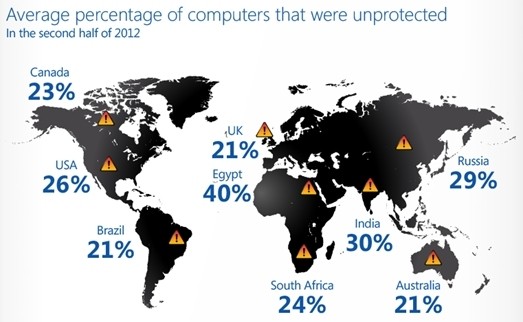Nearly a quarter of all PCs in the world are unprotected from virus, malware and other malicious threats according to Microsoft’s latest Security Intelligence Report. In it, Redmond said computers without any protection are 5.5 times more likely to become infected than systems running some sort of up to date anti-virus software.
The company’s research revealed that malicious documents like PDFs and Word documents are on the rise. During the fourth quarter of 2012, Microsoft said they detected and removed malicious documents from nearly three million computers.

Reasons for infection are aplenty. Some users let the trial period on their anti-virus expire or the software is simply out of date while some malware is capable of disabling anti-virus protection. In most of these cases, users aren’t even aware that they are no longer protected from online perils. Still others simply aren’t aware of how important it is to run protection in the first place.
Another source for infection is fake anti-virus software. These programs often look and feel like the real thing but they aren’t. Microsoft said they removed a prevalent scareware package called Onescan from close to three million computers worldwide in the second half of 2012.
It goes without saying that you should probably stick to a trusted vendor when selecting anti-virus software for your system. If you are running Windows 8, you’ve got nothing to worry about as the OS ships with anti-virus software built in.